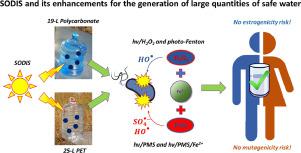Water Research ( IF 11.4 ) Pub Date : 2020-09-03 , DOI: 10.1016/j.watres.2020.116387 Paloma Ozores Diez 1 , Stefanos Giannakis 2 , Jorge Rodríguez-Chueca 3 , Da Wang 4 , Bríd Quilty 1 , Rosaleen Devery 1 , Kevin McGuigan 5 , Cesar Pulgarin 6

|
Solar disinfection (SODIS) in 2-L bottles is a well-established drinking water treatment technique, suitable for rural, peri‑urban, or isolated communities in tropical or sub-tropical climates. In this work, we assess the enlargement of the treatment volume by using cheap, large scale plastic vessels. The bactericidal performance of SODIS and two solar-Fe2+ based enhancements, namely photo-Fenton (light/H2O2/Fe2+) and peroxymonosulfate activation (light/PMS/Fe2+) were assessed in 19-L polycarbonate (PC) and 25-L polyethylene terephthalate (PET) bottles, in ultrapure and real water matrices (tap water, lake Geneva water). Although SODIS always reached total (5-logU) inactivation, under solar light, enhancement by or both Fe2+/H2O2 or Fe2+/PMS was always beneficial and led to an increase in bacterial elimination kinetics, as high as 2-fold in PC and PET bottles with tap water for light/H2O2/Fe2+, and 8-fold in PET bottles with Lake Geneva water. The toxicological safety of the enhancements and their effects on the plastic container materials was assessed using the E-screen assay and the Ames test, after 1-day or 1-week exposure to SODIS, photo-Fenton and persulfate activation. Although the production of estrogenic compounds was observed, we report that no treatment method, duration of exposure or material resulted in estrogenicity risk for humans, and similarly, no mutagenicity risk was measured. In summary, we suggest that SODIS enhancement by either HO•- or -based advanced oxidation process is a suitable enhancement of bacterial inactivation in large scale plastic bottles, without any associated toxicity risks.
中文翻译:

在大型塑料瓶中通过光芬顿或Fe2 + /过氧一硫酸盐活化过程增强太阳能消毒(SODIS)可以产生毒理学上安全的饮用水。
2-L瓶中的太阳能消毒(SODIS)是一种成熟的饮用水处理技术,适用于热带或亚热带气候中的农村,郊区或偏远社区。在这项工作中,我们通过使用廉价的大型塑料容器来评估治疗量的扩大。SODIS的杀菌性能和两种基于太阳能-Fe 2+的增强作用,即光芬顿(光/ H 2 O 2 / Fe 2+)和过氧单硫酸盐活化(光/ PMS / Fe 2+)是在19升聚碳酸酯(PC)和25升聚对苯二甲酸乙二醇酯(PET)瓶中,超纯水和真实水基质(自来水,日内瓦湖水)中进行评估的。尽管SODIS总是达到完全(5-logU)灭活,但在太阳光下,Fe 2+ / H 2 O 2或Fe 2+ / PMS或二者同时增强始终是有益的,并导致细菌清除动力学的提高高达装有自来水的PC和PET瓶装2倍,用于光/ H 2 O 2 / Fe 2+,然后在装有日内瓦湖水的PET瓶中加8倍。在暴露于SODIS,光芬顿和过硫酸盐活化1天或1周后,使用E-screen试验和Ames试验评估了增强剂的毒性安全性及其对塑料容器材料的影响。尽管观察到雌激素化合物的产生,但我们报告称没有治疗方法,暴露时间或材料持续时间对人类造成雌激素风险,并且类似地,也未检测到诱变风险。总之,我们建议通过HO • -或的高级氧化工艺可以适当地增强大型塑料瓶中的细菌失活,而没有任何相关的毒性风险。











































 京公网安备 11010802027423号
京公网安备 11010802027423号